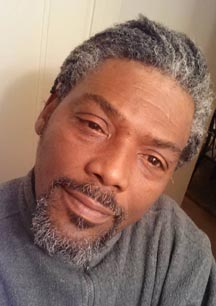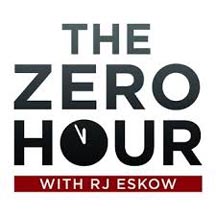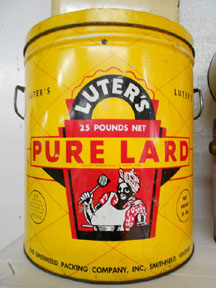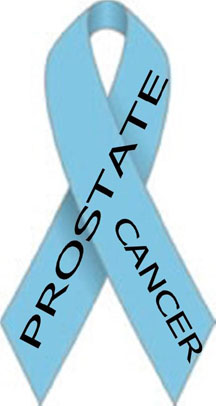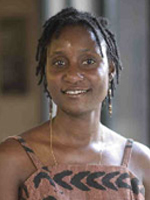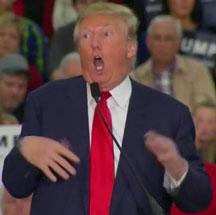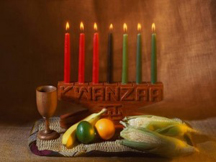If Opening From an E-mail,
Click Here for Better Viewing
December 22, 2016 — January 04, 2017
On The Dock This Issue:
 |
Why An Afrikan Revolutionary Voted for “The Duck” Trumps rise to power pleases a self-described Afrikan Revolutionary. | |
|---|---|---|
| New News Outlet: The Zero Hour Bernie Sanders' writer during his presidential campaign, Richard "RJ" Eskow, is host of the The Zero Hour. |
||
| Collecting Our History: How Black Memorabilia Shapes the Present Through the Past Images of African Americans have a lot to do with how people of color see themselves. |
||
| Prostate Cancer Clinical Trials Rally The initiative hopes to increase African American participation in prostate cancer clinical trials. |
||
| Contemporary African Immigration She told the story of James Kwegyir Agyeman Aggrey, who came to the United States from the Gold Coast (Ghana) in 1898 to attend Livingston College. |
||
| Voters with Disabilities Split Between Trump and Clinton While many people in the world felt that Trump made fun of people with disabilities, this voting group told pollsters they saw Trump as stronger on changing Washington and failed economic policies that hold people with disabilities back. |
||
| Activities Interesting, diverse things to do |
||
| Readers' Trends Port Of Harlem, Pinterest, and Facebook |
Trumps rise to power pleases self-described Afrikan revolutionary Kwasi Seitu. “I never voted for president before, but this time I was determined to cast a vote for The Duck, and not because I support him. I most definitely - - do not - - in any way - - support him, accept that I believe that he will be the most effective in further bringing about the demise of the pirate system and the leading pirate nation, the good ol' United States of America," says Seitu.
Seitu is the webmaster for The Virgin Islands 3, which seeks the release of three imprisoned men. He added “The Duck has outed the CIA, the FBI, and all other U.S. "intelligence" agencies as fabricators of fake news. Black folk and the whole not White world pretty much have been saying this about them for decades, now the president-elect has said it, too.”
Seitu is the webmaster for The Virgin Islands 3, which seeks the release of three imprisoned men. He added “The Duck has outed the CIA, the FBI, and all other U.S. "intelligence" agencies as fabricators of fake news. Black folk and the whole not White world pretty much have been saying this about them for decades, now the president-elect has said it, too.”
Trump and Jammeh
Ironically, as the United States is preparing for Donald Trump, who said during his surprisingly successful presidential run, "I could stand in the middle of 5th Avenue and shoot somebody and I wouldn't lose voters," Gambia is trying to let go of Yahya Jammeh, who surprisingly lost to Adam “No Drama” Barrow.
With similar larger than life bravado during his presidential campaign, Jammeh said, "I will deliver to the Gambian people and if I have to rule this country for one billion years, I will, if Allah says so." After accepting defeat, he later says he will not transfer power to Barrow.
“Both Trump and Jammeh use idiotic language for attention,” says Assan Manneh, a Gambian born banker now living in Omaha. “Jammeh’s lack of education and insecurities make him use hyperbolic and threatening language towards his political opponents.”
"I believe that he will be the most effective in further bringing about the demise of the pirate system and the leading pirate nation, the good ol' United States of America.”
On January 18, leaders of West African states said not only will they attend the January 18 inauguration of Barrow, but will guarantee the safety of the new president. On January 20, Trump is set to become president of the United States, after being elected with suspected help from the Russian government.
Both Trump and Jammeh are also known for their tension with the press. In April 2004, Jammeh called on journalists to obey his government "or go to hell." In June 2005, he stated on radio and television that he has allowed "too much expression" in the country.
Trump, who will remain on the payroll of NBC, one of the nation’s leading news services, for his work with the TV show Celebrity Apprentice, has also had highly controversial fights with news organizations. "This is an election about truth, and you're not going to get it from the dishonest media,” said Trump during a stop in Colorado.
For Trump this idea of "say it like it is" is what will create the biggest problem for his administration and the United States’ allies,” predicts Manneh.
"I believe that he will be the most effective in further bringing about the demise of the pirate system and the leading pirate nation, the good ol' United States of America.”
On January 18, leaders of West African states said not only will they attend the January 18 inauguration of Barrow, but will guarantee the safety of the new president. On January 20, Trump is set to become president of the United States, after being elected with suspected help from the Russian government.
Both Trump and Jammeh are also known for their tension with the press. In April 2004, Jammeh called on journalists to obey his government "or go to hell." In June 2005, he stated on radio and television that he has allowed "too much expression" in the country.
Trump, who will remain on the payroll of NBC, one of the nation’s leading news services, for his work with the TV show Celebrity Apprentice, has also had highly controversial fights with news organizations. "This is an election about truth, and you're not going to get it from the dishonest media,” said Trump during a stop in Colorado.
For Trump this idea of "say it like it is" is what will create the biggest problem for his administration and the United States’ allies,” predicts Manneh.
Bernie Sanders' writer during his presidential campaign, Richard "RJ" Eskow, is host of The Zero Hour, a new weekly three-hour independent radio and video program sponsored by Social Security Works. “Without corporate overlords, we're free to cover real news,” added Eskow.
With stories such as “Want to Understand Trump? Look to Europe” to “Mass Incarceration Must Go,” The Zero Hour runs for about 6 to 15 minutes each. On their website you can sign up got get episodes delivered to your inbox.
Images of African Americans, whether they are racist portraits of chocolate-skinned people with big red lips or positive images of iconic Blacks such as President Barack Obama and actress Cicely Tyson, have a lot to do with how people of color see themselves. Are they pretty and smart, or are they ugly and stupid?
People like Lindsey Johnson, CEO and president of L. Johnson Promotions Ltd., think that seeing images of both types helps teach the African-American community about its past and sends a message about the future.
Read the Whole Story
Read the Whole Story
The Prostate Health Education Network (PHEN) has started a special “Clinical Trials Rally” initiative to increase African American participation in prostate cancer clinical trials. Clinical trials serve as the basis for the growing number of new prostate cancer therapies and a move towards personalized treatments, which are rapidly defining the future of prostate cancer care. With only a relatively few Black men in current studies, the study results from these trials do not definitively determine the effectiveness of these treatments for Black men.
The prostate cancer death rate among Black men is 2.3 times greater than for men of any other racial or ethnic group within the United States according to the National Cancer Institute. This is the largest racial disparity for any type of cancer for men or women.
“Africans were not considered immigrants before the 1960s,” says Dr. Nemata Blyden of The George Washington University. But, she went on to explain that Blacks from Africa continued to arrive in the United States after slavery ended in 1863. According to the 1910 United States Census, only 473 arrived, but Congress saw fit to limit Black immigration with the 1917 Immigration law. Booker T. Washington, whom many do not see as a Black rights advocate, protested the law.
During her 25-minute talk she told the stories of early African "immigrants," including the story of James Kwegyir Agyeman Aggrey.
During her 25-minute talk she told the stories of early African "immigrants," including the story of James Kwegyir Agyeman Aggrey.
He came to the United States from the Gold Coast (Ghana) in 1898 to attend Livingston College. He was very involved with the AME Zion Church, married an African-American, and felt discriminated against because he was foreign born.
And then there was William Davis, says professor Blyden, who specializes in African/African Diaspora history. He changed his name to Orishatukeh Faduma “to reflect his African heritage,” also in the early 1900s, she continued.
And then there was William Davis, says professor Blyden, who specializes in African/African Diaspora history. He changed his name to Orishatukeh Faduma “to reflect his African heritage,” also in the early 1900s, she continued.
Two separate bipartisan polls showed that voters with disabilities and their family and friends split their votes between Hillary Clinton and Donald Trump. While many people in the world felt that Trump made fun of people with disabilities, this voting group told pollsters they saw Trump as stronger on changing Washington and failed economic policies that hold people with disabilities back - - despite Clinton’s position papers on the advancement of people with disabilities and rally in Florida on these issues.
In the bipartisan pre-election and election night survey conducted by Lake Research Partners and The Tarrance Group, voters with disabilities gave Clinton 49 percent of their votes and Trump 46 percent of their votes. But as with other Black subgroups, Blacks with disabilities gave Clinton 91 percent of their vote, which is huge even when taking the margin of error (-9.3% at the 95% confidence interval) into consideration.
The poll found that strong majorities of likely voters were more likely to support candidates who prioritize other policies to advance people with disabilities, including, “standing up against Hollywood bigotry and negative portrayals of people with disabilities (65 percent), and promoting positive media portrayals of people with disabilities in TV, Hollywood movies, and books (58 percent).
In an interview with VOX news, pollster Cornell Belcher generally explained this illogical phenomenon:
“The truth of the matter is if in fact we are a democracy, minorities here in the next 20 years are going to be the dominant political voice in our country. So there is a transfer of power that’s going to happen, and the question is, is it going to be peaceful or is it going to be one that destroys us?
They’re (Whites) not voting against their economic interests; they are voting for their higher interests — there’s an idea that your group positioning doesn’t matter economically. The idea that you can disconnect White people from their group position and make pocketbook arguments to them void of the history of their group is folly.
In the bipartisan pre-election and election night survey conducted by Lake Research Partners and The Tarrance Group, voters with disabilities gave Clinton 49 percent of their votes and Trump 46 percent of their votes. But as with other Black subgroups, Blacks with disabilities gave Clinton 91 percent of their vote, which is huge even when taking the margin of error (-9.3% at the 95% confidence interval) into consideration.
The poll found that strong majorities of likely voters were more likely to support candidates who prioritize other policies to advance people with disabilities, including, “standing up against Hollywood bigotry and negative portrayals of people with disabilities (65 percent), and promoting positive media portrayals of people with disabilities in TV, Hollywood movies, and books (58 percent).
In an interview with VOX news, pollster Cornell Belcher generally explained this illogical phenomenon:
“The truth of the matter is if in fact we are a democracy, minorities here in the next 20 years are going to be the dominant political voice in our country. So there is a transfer of power that’s going to happen, and the question is, is it going to be peaceful or is it going to be one that destroys us?
They’re (Whites) not voting against their economic interests; they are voting for their higher interests — there’s an idea that your group positioning doesn’t matter economically. The idea that you can disconnect White people from their group position and make pocketbook arguments to them void of the history of their group is folly.
That is not to say don’t target or don’t go after them. That’s absolutely not what I’m saying. What I am saying is just that the answer isn’t simply a pocketbook argument — we do have to inoculate against the increased tribalism and racialism in order to have that conversation. As long as there is a group sense of decline, we do have to calculate for that in our conversation and try to inoculate that as opposed to simply coming up with another argument about why raising the minimum wage (as an example) is beneficial to you.”
While voters were more likely to say they had heard Clinton’s position on people with disabilities, still 60 percent did not hear anything positive while another eight percent responded they did not know. From Trump, 69 percent did not hear anything positive and 12 percent did not know.
Trump’s campaign manager Kellyanne Conway had this takeaway that seems to support Belcher’s observation that group (White racial) positioning affected them more than living with a disability.
"There's a difference to voters between what offends you and what affects you. And they were being told constantly, 'Stare at this, care about this, make this the deal-breaker once and for all.' And they were told that five or six times a week about different things. And yet they went, they voted the way voters have always voted: on things that affect them, not just things that offend them."
Jennifer Laszlo Mizrahi, president of RespectAbility, a nonprofit organization fighting stigmas and advancing opportunities for people with disabilities, commissioned the two polls. In her press statement, she added, “Voters with disabilities tend to be less educated and experience poverty at greater levels than other Americans. Indeed, only 1-in-3 working age people with disabilities in America has a job. A White House study earlier this month found that only 65 percent of youth with disabilities graduate high school, 19 percent less than students without disabilities.
These statistics support the general notion that Trump’s base of support is low-income, information-challenged White people.
While voters were more likely to say they had heard Clinton’s position on people with disabilities, still 60 percent did not hear anything positive while another eight percent responded they did not know. From Trump, 69 percent did not hear anything positive and 12 percent did not know.
Trump’s campaign manager Kellyanne Conway had this takeaway that seems to support Belcher’s observation that group (White racial) positioning affected them more than living with a disability.
"There's a difference to voters between what offends you and what affects you. And they were being told constantly, 'Stare at this, care about this, make this the deal-breaker once and for all.' And they were told that five or six times a week about different things. And yet they went, they voted the way voters have always voted: on things that affect them, not just things that offend them."
Jennifer Laszlo Mizrahi, president of RespectAbility, a nonprofit organization fighting stigmas and advancing opportunities for people with disabilities, commissioned the two polls. In her press statement, she added, “Voters with disabilities tend to be less educated and experience poverty at greater levels than other Americans. Indeed, only 1-in-3 working age people with disabilities in America has a job. A White House study earlier this month found that only 65 percent of youth with disabilities graduate high school, 19 percent less than students without disabilities.
These statistics support the general notion that Trump’s base of support is low-income, information-challenged White people.
Washington
Fully Committed
MetroStage
1201 N. Royal
Thu, Dec 8–Sun, Jan 8, $
Straight White Men
Studio Theater
9th and P, NW
through Sun, Dec 31, 2016, $
BZB Gift Show
Shiloh Baptist Church
9th and P Streets, NW
Fri Dec 23, 10a-9p, free
Alexandria Holiday Market
300 John Carlyle Street
Alexandria
Dec 9-11,16-22,11a-7p, free
Anacostia Community Museum Kwanzaa Events
Fort Stanton Recreation Center
one block from the museum at
1810 Erie Street, SE
Tue 27, 11a-1p, free
Wed 28, 10:30a-12p, free
Anacostia Community Museum
1901 Fort Place SE
Thursday 29, 10:30a-2:30p, free
Fully Committed
MetroStage
1201 N. Royal
Thu, Dec 8–Sun, Jan 8, $
Straight White Men
Studio Theater
9th and P, NW
through Sun, Dec 31, 2016, $
BZB Gift Show
Shiloh Baptist Church
9th and P Streets, NW
Fri Dec 23, 10a-9p, free
Alexandria Holiday Market
300 John Carlyle Street
Alexandria
Dec 9-11,16-22,11a-7p, free
Anacostia Community Museum Kwanzaa Events
Fort Stanton Recreation Center
one block from the museum at
1810 Erie Street, SE
Tue 27, 11a-1p, free
Wed 28, 10:30a-12p, free
Anacostia Community Museum
1901 Fort Place SE
Thursday 29, 10:30a-2:30p, free
Holiday Pop-up Shop
(10+ Fashion Talent Shops)
3301 Rhode Island
Mt. Rainier, MD
now though Dec 23, free
Kwanzaa Celebration
Four Walls Technical
1125 Neal St, NE
Mon, Dec 26, 5:30p-10p, free
Baltimore
Kwanzaa Celebration
Benjamin Banneker Historical Park and Museum
300 Oella Avenue
Baltimore, MD
Fri, Dec 30,1:30p-3p, free
New York
3rd Annual "Gift-A-Toy-Drive"
Richard Beavers Gallery
408 Marcus Garvey Blvd
Brooklyn
Thu, Dec 22, 7p-10p
Richmond
Elegba Folklore Society
2016 Capital City Kwanzaa Festival
Fri, Dec 30
Coming
Fidel Castro Memorial
Festival Center
1640 Columbia Road, NW
Washington, DC
Sat, Jan 7, 3:30p, free
I Am Not Your Negro
by James Baldwin
Starring Samuel L Jackson
Fri, Feb 3, $
(10+ Fashion Talent Shops)
3301 Rhode Island
Mt. Rainier, MD
now though Dec 23, free
Kwanzaa Celebration
Four Walls Technical
1125 Neal St, NE
Mon, Dec 26, 5:30p-10p, free
Baltimore
Kwanzaa Celebration
Benjamin Banneker Historical Park and Museum
300 Oella Avenue
Baltimore, MD
Fri, Dec 30,1:30p-3p, free
New York
3rd Annual "Gift-A-Toy-Drive"
Richard Beavers Gallery
408 Marcus Garvey Blvd
Brooklyn
Thu, Dec 22, 7p-10p
Richmond
Elegba Folklore Society
2016 Capital City Kwanzaa Festival
Fri, Dec 30
Coming
Fidel Castro Memorial
Festival Center
1640 Columbia Road, NW
Washington, DC
Sat, Jan 7, 3:30p, free
I Am Not Your Negro
by James Baldwin
Starring Samuel L Jackson
Fri, Feb 3, $
| From the Last Issue | On Pinterest | On Facebook | On Website | |||
|---|---|---|---|---|---|---|
 More White People Are Dying Than Are Being Born in 17 States |
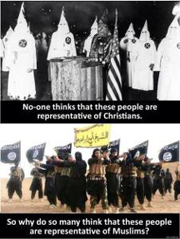 White Supremacists More Deadly than Jihadist (3rd consecutive) |
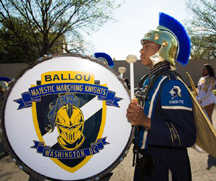 Not one D.C. high school marching band wants to play Donald Trump’s inauguration | 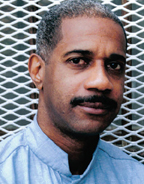 The Other Side Voices of the Incarcerated (4th consecutive) |






